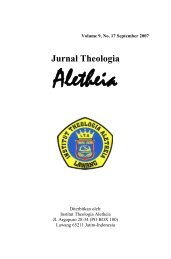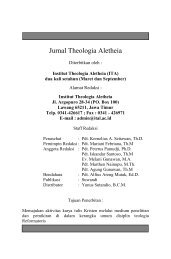download - Sekolah Tinggi Theologia Aletheia Lawang
download - Sekolah Tinggi Theologia Aletheia Lawang
download - Sekolah Tinggi Theologia Aletheia Lawang
Create successful ePaper yourself
Turn your PDF publications into a flip-book with our unique Google optimized e-Paper software.
73<br />
church and the authority of the magistrate, both of which are<br />
secondary authorities under the Word and to which the believer<br />
owes secondary obedience insofar as they are faithful to the Word.<br />
Where they are, obedience to them is obedience to Christ.<br />
In summary, then, the biblical imperatives ―trust‖ (faith) and<br />
―obey‖ (obedience) are thoughtfully developed, biblically defined<br />
foundations of Calvin‘s theology from the outset. In his<br />
commentaries—for which The Institutes are the doctrinal<br />
framework and summary—his catechism, church polity, polemical<br />
essays, and sermons, Calvin consistently works with the notions of<br />
faith and obedience outlined in this first edition. The material is<br />
amplified, clarified, deepened, and rearranged in the many<br />
subsequent editions of The Institutes. But the basic contours of<br />
faith and obedience remain unchanged.<br />
The 1559 Edition<br />
In Calvin‘s final, 1559 edition of The Institutes faith and<br />
obedience are discussed at length in book three, which deals with<br />
the appropriation or receiving of the salvation brought by Christ.<br />
In this edition book one deals with God the Father and his works of<br />
creation and providence, and book two treats God the Son and his<br />
work of redemption. Book three examines God the Holy Spirit and<br />
his work of applying salvation to the believer. The last book<br />
explains the church (and the state). At the outset of book three<br />
Calvin introduces the Holy Spirit, faith as the main work of the<br />
Spirit, and the obedient life as the expression of faith. This<br />
represents a different setting or context and a different sequence<br />
than in the 1535 edition. Now obedience follows faith as subjects<br />
for consideration; there obedience preceded faith. Here the two<br />
ideas are not explained in the context of the decalogue and the<br />
Apostles‘ Creed, as they were there; they are embedded in the<br />
dynamic life and activity of the third person of the Trinity.<br />
Since we are incapable of the obedience that honors and<br />
glorifies God and is articulated in his law, Calvin begins, God has




